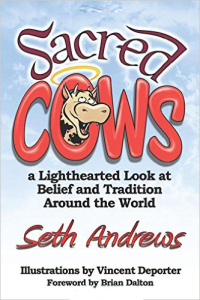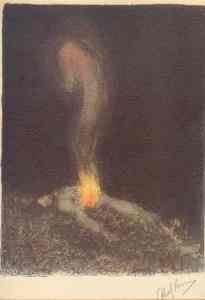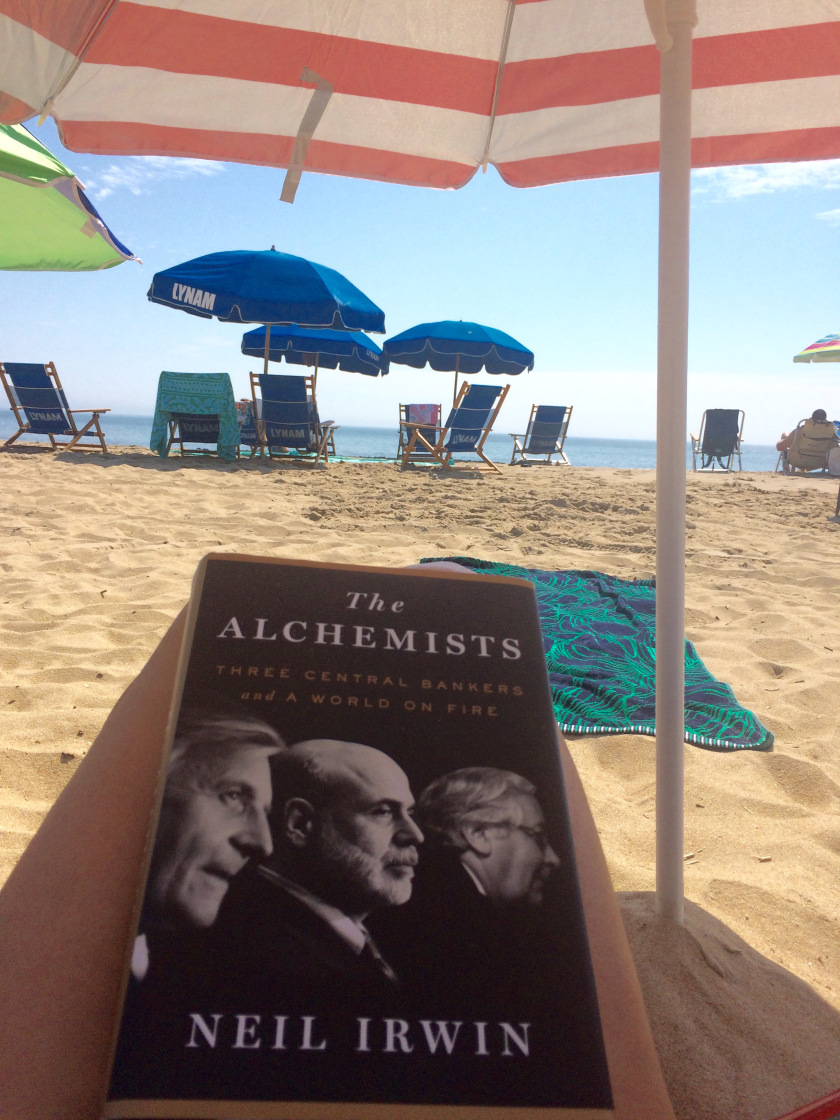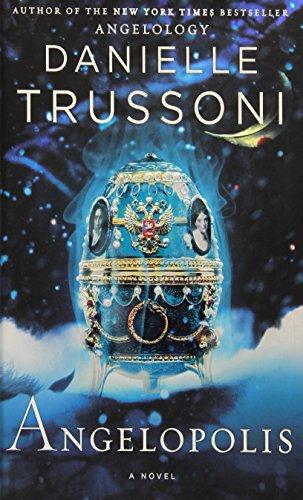
I’m not quite sure what to think of Sacred Cows, or more specifically what to make of how I felt myself reacting to it. It’s the kind of book that in some respects would seem to fit my beliefs and values quite well, yet I found it vaguely unfair or unappealing in some way.
The book is subtitled A Lighthearted Look at Belief and Tradition Around the World. (I assumed it was about religious beliefs and practices specifically—probably being overly influenced by the word Sacred in the title and the concept of the sacred cow’s connection with Hinduism—and throughout the first portion of the book any time it strayed into other areas I felt like the author was having trouble staying on point, but in fact it never claims to be about religion only. It’s about odd and irrational beliefs and traditions in general, only some of which are religious in nature, though all or almost all of them have some supernaturalism to them.)
Andrews is the kind of skeptic I’m used to from Skeptical Inquirer and Skeptic magazines. He’s strongly in favor of science and rationality, and opposed to supernatural beliefs or beliefs that are in the areas that science covers yet are not rationally justified. So, he has little use for religion (he’s a proud atheist), New Age mysticism, psychics, alternative medicine, etc. He’s frank about his opinion of such matters. He also is a humorist, and he strives to make the book as fun and entertaining as he can, incorporating cartoon drawings and such.
So like I say, this should be right up my alley. I’m that same kind of skeptic. I favor rationality over irrationality (regarding that as at least pretty close to a tautology, since I’m not sure how you could defend or consciously embrace irrationality—at least as I understand the term—without contradicting yourself). I’m an atheist. I think religion is based on claims that are as unlikely and absurd as the Tooth Fairy (at least any kind of fundamentalist or literalist religion; I’m sure there are sufficiently watered down, non-literal versions of religion that I would agree with or be neutral about), and that it has historically done considerably more harm than good (though it is responsible for plenty of both). I think faith healers, psychics, peddlers of quack medicine, etc. are generally despicable con artists, though occasionally sincere and deluded (with their followers being much more often sincere and deluded than dishonest). I like humor, and generally appreciate an effort to make an otherwise dry topic entertaining and funny.
Is it perhaps that I take some kind of a relativist stance that my beliefs (and Andrews’s) are no better than anyone else’s, and that I therefore don’t think anyone’s beliefs should be criticized? No, I think that’s a decidedly silly (and ultimately incoherent) position to take.
Is it perhaps that I think there’s something special about religion, or maybe about any beliefs that are of particularly strong emotional importance to people, such that those beliefs specifically are off-limits to criticism? No, I’ve never held that position, and I think that’s an unjustified double standard. Indeed, I’ve explicitly argued against that position in, for example, my writing about Richard Dawkins.
Is it perhaps that while I think it’s acceptable to criticize religion, I do not countenance doing so with humor or irreverence, on the grounds that this is disrespectful? Evidently not, since I thought Ken’s Guide to the Bible was laugh out loud funny.
So what is it, then, that made me at times uncomfortable with Sacred Cows?
Maybe I do retain a small element of a double standard on these matters, a preference to avoid ridiculing or insulting people. Or at least a requirement to “bring your best stuff” when you do, to make an extra effort to be sure that you are justified when you treat something that is hugely important to people as not just mistaken, but “beyond the pale” ridiculous.
And there are times I think Andrews fails to do that, times I think he is wrong or at least where it’s a gray area where he might be wrong, or times I think he is taking a cheap shot.
A good example is one of the first such cases that jumped out at me. In discussing (and making fun of) Catholicism, Andrews comments on Pope Benedict’s surprise abdication from the Papal throne thusly: “The Pope had officially vacated his seat weeks earlier for reasons of poor health, an unexpected move which impacted the lives of…nobody” (ellipsis in original).
Um, really? Changing popes had no effect on anyone whatsoever?
You can argue about whether the overall effects are good or bad. You can argue over whether people who are influenced by such a thing are guilty of unjustifiably blind obedience to an authority figure. You can point out that far from a hundred percent of Catholics abide by what the Pope says, even when he makes a proclamation ex cathedra, when he is supposed to be infallible (look how many American Catholics defy Church teachings on birth control and abortion, for instance). But to say that changing popes has no consequences is blatantly, provably wrong, like saying no pope has ever been greater than five feet tall.
It’s just saying something false, and dumb, to go for a cheap laugh.
I think you can also make the case that at times Andrews treats traditions and rituals as being intended and accepted a lot more seriously and literally than they really are, again because that makes them easier to make fun of. I mean, certainly some of the ones he discusses in the book really are taken as deadly serious and literal by most of the people who believe in them, but some are not.
I also wonder about the inclusion of some of the topics, especially the Church of Euthanasia. I had never heard of the latter before reading of it in this book, but it’s almost certainly tongue-in-cheek, or if it’s not then it probably has something like three or four “members”—just a few bozos with enough time and money to put up a website with a lot of crazy bullshit about how great it would be if everyone committed suicide.
Don’t get me wrong; I agree with at least 90% of this book. Most of the things he ridicules deserve it, most of the specific points he makes are accurate, and most of the time I don’t find his jocular approach inappropriate. But there are just enough exceptions to adversely affect my overall impression of the book.
The topics Andrews chooses to address, or single out for his ridicule, (and it seems a rather arbitrary list) are:
• Snake handlers
• Pacific island cargo cults (which really are a bizarre and anthropologically fascinating phenomenon)
• Catholicism
• Sacred cows in India, and other animals that have some exalted position in some religion or cultural tradition or other
• Mormons
• The Church of Euthanasia
• Weird funeral customs around the world
• Psychics
• An annual penis festival in a Japanese town (clearly intended as tongue-in-cheek by almost all concerned)
• The legend in parts of Europe that Santa Claus is accompanied by an evil demon to torture ill-behaved children and take them to Hell (doubtful this is taken any more literally in those countries than Santa Claus himself is there and elsewhere)
• Faith healers and alternative medicine
• Body modification, especially the tribe in Burma whose women make their necks freakishly long by wearing devices that stretch their necks over the course of decades
• Scientology
• The Sabbath rules in Judaism
• The tradition in the Philippines for certain Christians to literally have themselves crucified
• Rituals that involve cruelty to animals, or involve people taking bizarre risks
• New semi-serious religions based on something in pop culture (e.g., Star Wars, Star Trek, or The Big Lebowski)
• The Church of Satan (though he recognizes it’s a sort of put-on or satirical criticism of Christianity; it’s really the reaction to it that he’s ridiculing as irrational rather than the Church of Satan itself)
• End of the world prophecies
I did like his Afterword quite a bit, where he summarizes his own philosophy of life and his motives for choosing this book topic and approaching it the way he did. I find little if anything to disagree with there.
I’m going to recommend Sacred Cows, albeit not without reservations and not as enthusiastically as I would like. It’s mostly right-headed, and I appreciate that Andrews is an ally in wanting the world to be a less irrational, cruel, stupid place.
Advertisements Share this:




